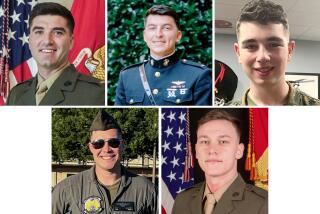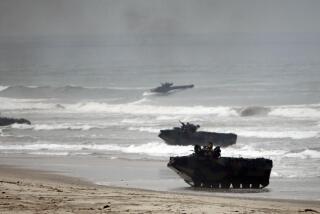Five Marines honored for bravery in 2005 Iraqi firefight
CAMP PENDLETON — Jesse Hickey admits he was afraid during a firefight in Iraq in which five Marines were killed and 11 badly wounded -- afraid not for his life but that he might let down his comrades.
Hickey was a Navy corpsman with a Marine platoon ordered to roust insurgents from a region along the Iraq border with Syria. As they were clearing homes in a village called New Ubaydi, the platoon was ambushed by insurgents firing AK-47s and throwing grenades from at least four fortified positions.
One Marine was killed instantly, others were wounded and in danger of bleeding to death. Hickey was in the middle of a close-in firefight that lasted most of an hour.
“My job was making sure people stayed alive,” Hickey said. “I saw dead guys everywhere. It seemed like it went on forever.”
Marine leaders say that Hickey performed his job with great courage and resourcefulness, dashing 75 yards into the “kill zone” to rescue Marines, refusing to be evacuated even when wounded by shrapnel.
On Thursday, Hickey was among five military personnel with the 2nd Battalion, 1st Marine Regiment honored at Camp Pendleton for their bravery on the cold, chaotic morning of Nov. 16, 2005.
Hickey, former Cpl. Javier Alvarez and Gunnery Sgt. Robert W. Homer were each awarded the Silver Star. A Silver Star was also awarded posthumously to 2nd Lt. Donald R. McGlothlin.
The Navy Cross, the second-highest medal for bravery that can be bestowed on a Marine or sailor, was awarded to Lance Cpl. Joshua Mooi.
Mooi attacked the insurgents at close range with grenades and his M-16. Six times he went into the ambush site, helping a dozen Marines to escape and killing four insurgents. When his rifle was destroyed by enemy fire, he grabbed one from a downed Marine and kept firing.
Alvarez led Marines 100 yards into the fray, directing fire at the insurgents. When an insurgent grenade landed in the Marines’ midst, he attempted to throw it back. It exploded, blowing off Alvarez’s right hand.
Homer moved three wounded Marines out of the line of fire, and directed tank- and machine-gun fire at the insurgents.
McGlothlin, the platoon commander, fought his way into a building where Marines were pinned down. Using his body to shield Marines being evacuated, he exchanged gunfire with insurgents inside the building before being mortally wounded.
He was in the doctoral program in chemistry at Stanford when he joined the Marine Corps. His mother, who wears a button saying “My Son Is A Marine,” said she was not surprised that her son, who was 26, risked his life to save the Marines under his command.
“Anything he ever did, he did well,” said Ruth McGlothlin, a high school counselor in Lebanon, Va.
Homer, 31, a career Marine, cannot speak of McGlothlin for long without his voice breaking.
“I miss him a lot,” he said. “I wish I had him here, as a mentor.”
Mooi, 22, plans to attend Northern Illinois University to study criminology. Alvarez, 28, attends the University of Arizona and hopes to become an architect. He said other students sometimes stare at his prosthetic hand.
Hickey, 26, is studying nursing at a community college in New Mexico. He said he felt strange about being included with the four Marines to receive a medal for bravery.
“I think of them as heroic, but me, personally, I was just doing my job,” he said.
--
More to Read
Sign up for Essential California
The most important California stories and recommendations in your inbox every morning.
You may occasionally receive promotional content from the Los Angeles Times.










